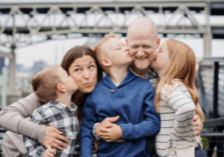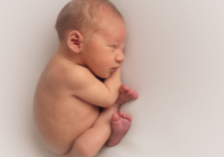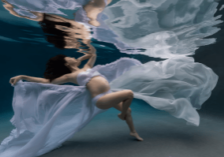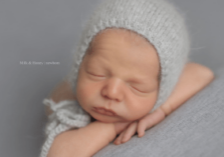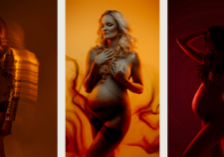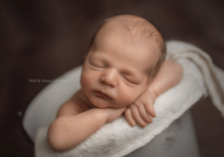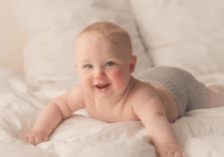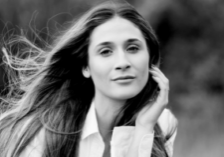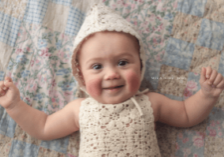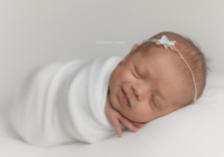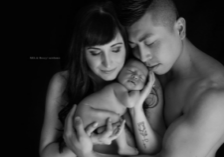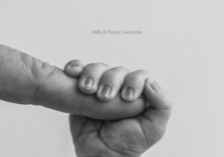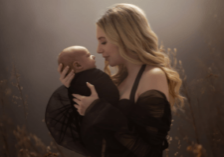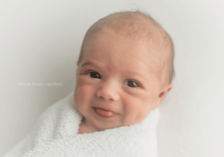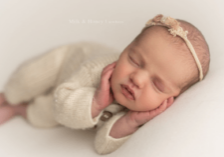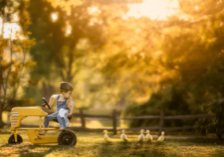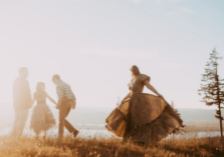Family Filmmaking – Documentary-Style Family Films with Anja Poehlmann
Family photographers strive to capture a fleeting moment in time, a family as they are today before the kids grow out of this stage of life. One of the most magical ways to do that is to document a family through a documentary-style family film.
While family films might seem intimidating to us photographers, they are a truly unique offering that your clients will cherish for years. And with practice, you can confidently offer family films in addition to your current photography packages.
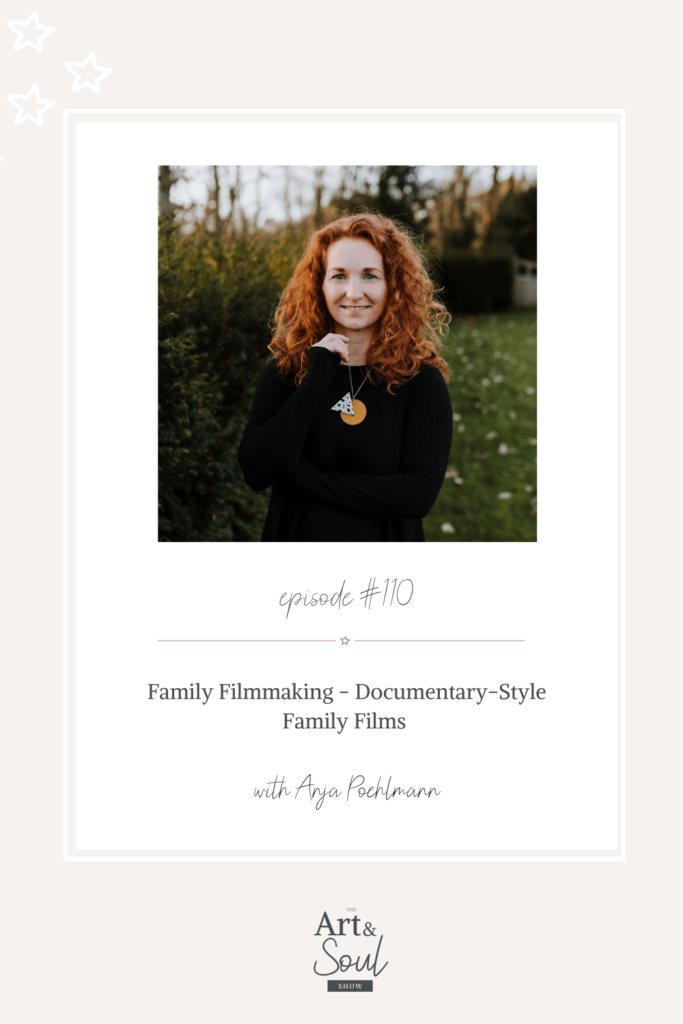
In this episode, I’m chatting about branching out into family films with documentary-style photographer and filmmaker Anja Poehlmann.
Anja is sharing how she discovered photography and filmmaking, and she’s explaining how she eventually merged the two to offer one-of-a-kind family photo experiences. We’re talking about what it means to be a documentary-style photographer and how it can help you capture genuine moments for your clients. Plus, Anja is sharing her best advice for creating a business that’s both profitable and sustainable.
What’s in this episode:
- How documentary-style family photography varies from traditional family photography [2:46]
- How Anja found her passion for photography and filmmaking and then turned her passion into a business [5:07]
- How to learn to make and start offering family films to your clients [7:40]
- How to use your equipment during a family film session [10:34]
- Where to find music you can legally use in your family films [11:39]
- Anja’s idea of a “dream session” and her most memorable session [15:19]
- Why business skills are just as important (if not moreso) as artistic talent [19:03]
- How to create a business that’s both profitable and sustainable [22:51]
If you’ve ever felt the itch to branch out into video or family films, tune into this episode.
SUBSCRIBE: iTunes | Spotify | Stitcher
Resources Mentioned
Audiio, a resource for music to put in your films
Meet Anja Poehlmann
Anja is a filmmaker and photographer for families and businesses. Coming from a background of working in video production, she’s been running her photography business as a side hustle since 2010. She finally dared to make the jump to going full time with video and photography at the end of 2019.
Throughout this time, she’s learned so much about marketing and running a business as well as about herself. She’s struggled with Impostor Syndrome (still does), mindset issues and money blocks. The thing that keeps her going is her love for the art of photography and video.
Connect with Anja
Did hearing from Anja about family films get your creative juices flowing?
You may also enjoy these episodes
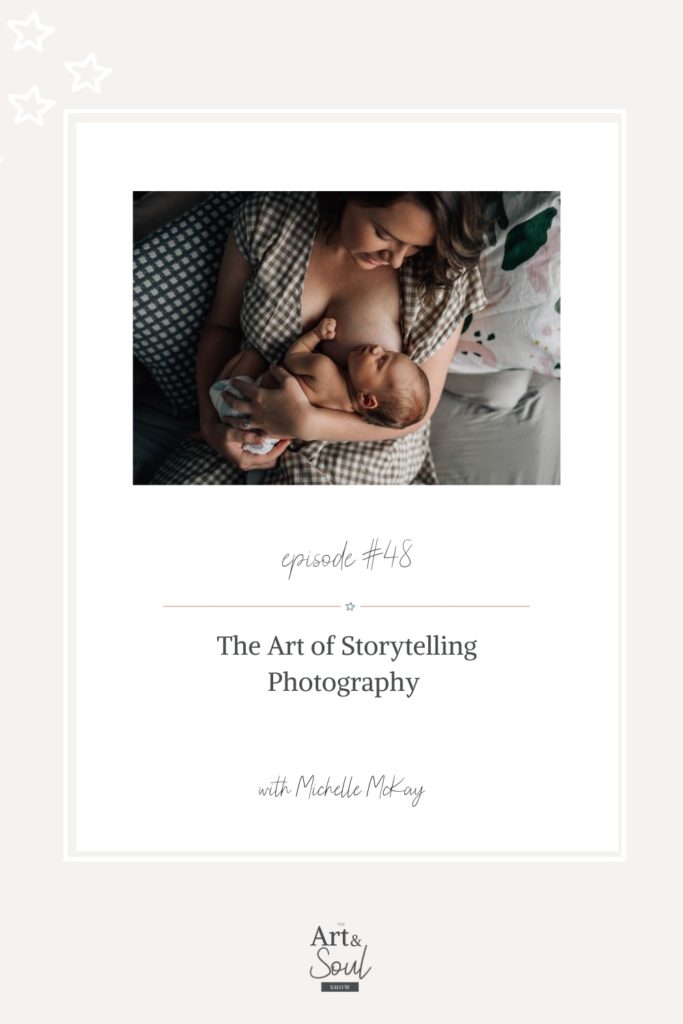
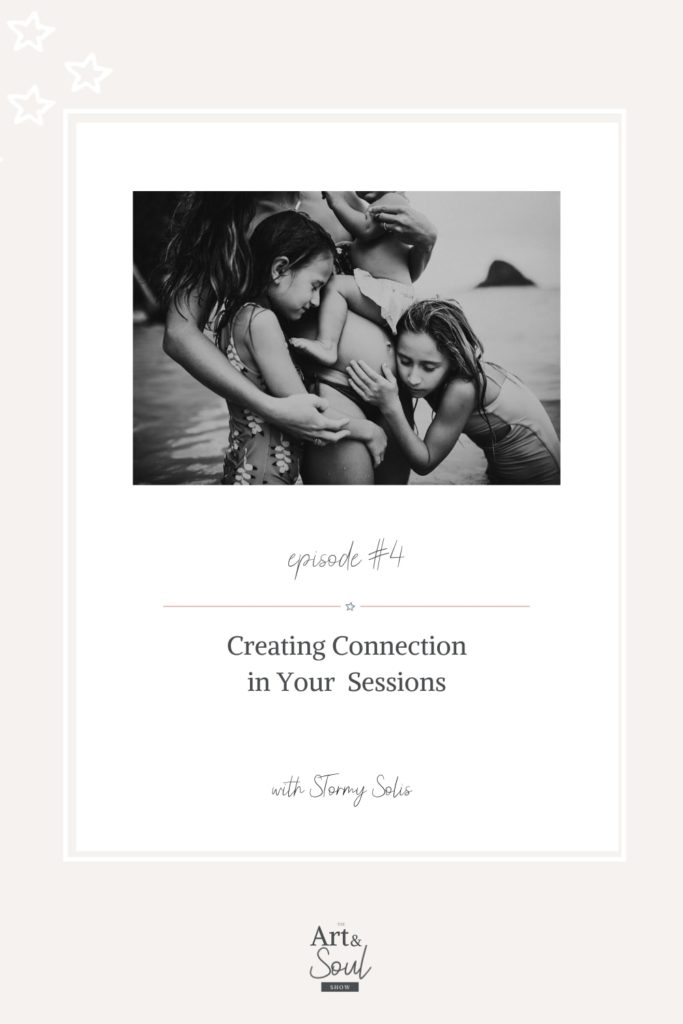
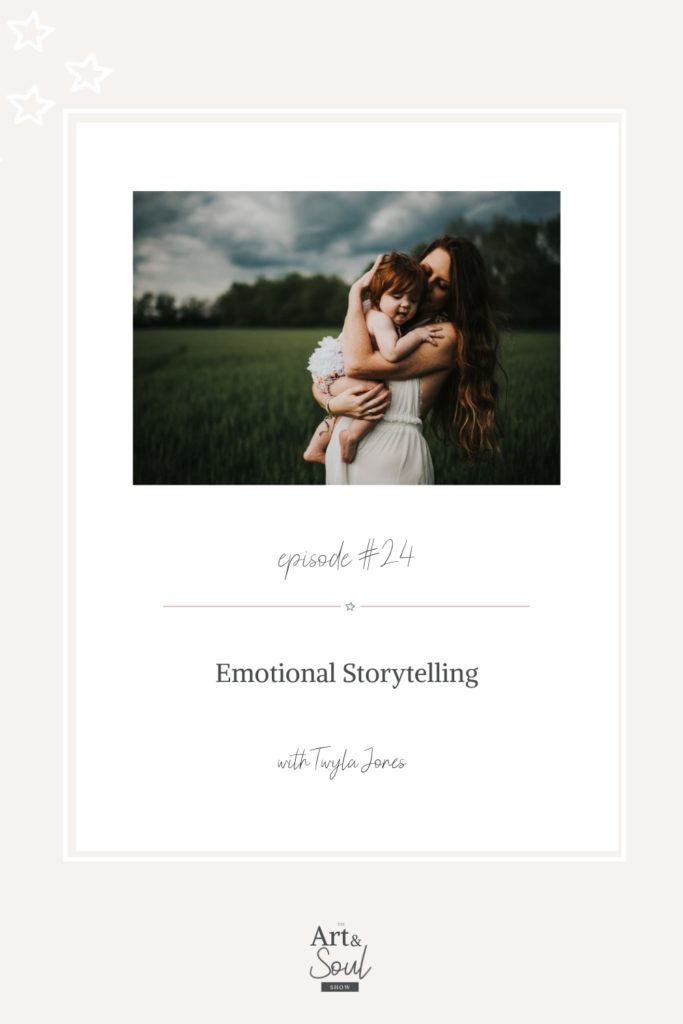
Transcript:
[00:00:00] Anja Poehlmann: So important, isn’t that because we get so trapped in our own bubble full of photographers who will all speak the same language, but that that language doesn’t necessarily translate outside of our little bubble? And it’s so important to be aware of how we present ourselves as artists and as business people, and how we can explain to others what we do besides the numbers, because the layman can compare numbers. That’s why they compare us in price. But that’s why we need to give more than that. And it’s like the way we see the world, just like you said. That’s what separates us from someone with a nice smartphone.
[00:00:38] Lisa DiGeso: Exactly. And they’re getting better and better with those darn smartphones.
[00:00:42] Anja Poehlmann: But they can still, they still can’t see what we see. No, no, no.
[00:00:51] Lisa DiGeso: Welcome to the Art and Soul show, where we dove into heart opening chats on photography, business life and that messy in between. I’m your host, Lisa DiGeso, a mom, a photographer and entrepreneur, and I’ll be sharing honest conversations and advice for photographers with insight on mindset, entrepreneurship and creativity. The goal of this podcast is for you to be able to gain insights and strategies that will get you real results. Because let’s face it, having a photography business can be lonely, but it doesn’t have to be. This is the place you can go when you need a boost of encouragement, a kick in the pants and inspiration to pick up your camera. This is the Art and Soul show. Hello, my beautiful friend. Welcome back to the show. Today, I’m hanging out with Anja Poehlmann. I am so excited to dove into this conversation with her. She’s a filmmaker and photographer for families and businesses, and she actually comes from a background working in video production. She has been running her business as a side hustle since 2010, and she finally decided to make a full-time career in 2019, she has won the Reportage Family Award in 2020 and has been a finalist for the documentary Family Awards for the past two years. I’m so excited to dove into this conversation talking about filmmaking and documentary style photography and just running a business in general. So without further ado, here is Anja. Welcome.
[00:02:18] Anja Poehlmann: Thank you.
[00:02:20] Lisa DiGeso: So tell us who you are and what you’re passionate about.
[00:02:23] Anja Poehlmann: Sure. So my name is Anja. I am a photographer and filmmaker, and I’m based on the south coast of England. I’m originally from Germany and I am passionate about documenting life. So my work is very documentary based, especially the photography and family photography side of it. But for me, it’s very much just about capturing life as it is unfiltered.
[00:02:46] Lisa DiGeso: Love it. I love it. Well, I come from a very posed portrait background of photography. Can you share with our listeners a little bit about your approach when it comes to your photography versus maybe how a portrait photographer post photographer would approach their sessions?
[00:03:03] Anja Poehlmann: Absolutely. So my style of photography is completely unopposed. While I can appreciate how beautiful photos look like the lifestyle in the post version of family life. My style is very raw and it’s literally just documenting what’s happening in front of me. So in my sessions, I don’t tell my families what to do, sometimes a bit unsure, like what’s going to happen? I can give them some ideas like maybe you want to do the dishes, you want to bake a cake, you just play some board games, whatever you want to do. But I usually don’t actually tell them anything, and I just come by with my camera. I just document what’s happening, and I would never ask them to do anything again just for the photo. I don’t ask them to turn to the light. I literally just have to work with what I get, and I think that’s the beauty of it. For me, the challenge is to make beautiful paragraphs in a situation, in a setting that I can’t control.
[00:03:57] Lisa Digeso: Yeah, I love that. So how do you feel that maybe your personality led you to find yourself as a documentary photographer and filmmaker?
[00:04:06] Anja Poehlmann: I think it’s because I’m an introvert, so I like being in my own company and being around a lot of people drains me, which is quite interesting because families are not quiet at all. So after a family session, I’m usually naked yet. But I think documentaries are really good for anybody who is introverted because first of all, we can relate better to the introverts in the family because not every family is extroverted. There’s a lot of introverts out there who have to exist in an extroverted world, which can be quite challenging. And I think it’s good because first of all, I can relate to those, but I can also take myself out of the situation, so I’m not exactly a fly on the walls. I talk to people, I talk to the families that I work with, but I can take myself out of the situation and literally just be there with a camera and just kind of observe. And I don’t always have to jump in and give my part of what I see. Yeah, it’s very much observing rather than taking part in anything or creating a scene.
[00:05:07] Lisa Digeso: I love that. So can you tell and share with our listeners how you discovered photography and found your passion for it?
[00:05:13] Anja Poehlmann: Oh, that’s some. That’s been quite a go. When I was in university the early 2000s, and that’s when digital cameras came about. Yeah, I started playing with s. I had a little bridge camera. I think it was a canon. And one of my friends was actually very much interested in photography, and she had a mirror at night. She had a reflex camera. Not even a digital was an analog one. And we were not taking photos and I kind of got into it. And then I went abroad for half a year to Hawaii, and I took my camera with me and I documented everything I did and everything I saw and all of the people that I interacted with and the person I lived with. He said, You really have an eye for it. Things like you need to keep this up, and when I come back, come back home. I took my dad’s digital reflex camera, which was a canon rebel, the first when they came out and kind of just ran with it. And then he got me my phone and it just kind of snowballed from there. So I took photos of everything that happened around me, and played around. I read a lot, so I don’t have any. I’m not trained as a photographer like an outside source. It’s literally just I just figured out what the numbers mean, how the camera works, and over time, people came to me, Oh, can you take photos of me? Can you take photos, my children? Can you take photos at my wedding? And at some point I’m like, Yeah, I probably shouldn’t make this a business now. People actually pay me.
[00:06:27] Lisa Digeso: Yeah, I love it. And so then you added filmmaking into it. So how did that come about?
[00:06:33] Anja Poehlmann: So for me, filmmaking and photography were always two different things, even though that like photo and film, they rely on the same principles and we use the same devices for it now. Anyway, we didn’t. When I started with this, they were always different like individual things for me and I actually trained in film and photography was my personal outlet. And then when I went to Hawaii, I kind of combined them in a way that I had video at work and photo after work. Over time, it just kind of meshed more and more, and I combined it just naturally. I it took me a long time to really acknowledge that can combine them and actually make them work for me with me, just basically me being everything because I always thought as a video producer, I want to be employed and as a photographer, I don’t want to be employed because I want to make my own rules. And over time, I realized I can make my rules, my own rules, no matter what. And only then two years ago that I fully went full time as a filmmaking photographer, but I’ve been doing it for 15 years.
[00:07:38] Lisa Digeso: I love it. Love that. So I love that you offer family films in your sessions, too. So for maybe someone that doesn’t do them, what would be your advice on getting started with that?
[00:07:49] Anja Poehlmann: If someone wants to offer family films, they need to understand how to make films. It’s easy to say, Well, you’re already there. You might as well just get some video. And even though, like I said, photography and film relies on the same principles and are very, very different in a lot of ways. So you need to understand how to use your camera to actually create the same level of quality for films that you do for photos. A lot of photographers try to play with it, and the result isn’t what they used to get from the photos. Because you have to, you have to use shutter speed and frame rate differently than you think you would in photography, and you have to understand the basics behind it. And I think the film is amazing. It’s so much fun. And just bringing the whole element of sound and visual like sound and movement to an image just has such a massive impact. And if you understand how to use it, well, it can take you so far. And it just has a very steep learning curve at the beginning because it’s so different. But I think if someone wanted to start with it, you just put your camera and film mode in video mode and try it, see if you actually feel like you want to learn about it and then go on YouTube and just literally watch everything. You can understand how to use your camera and apply and practice over and over and over and don’t rush into client sessions saying I’m offering video now. Yeah, because that’s the danger of people being too eager. And I think if someone actually wanted to offer that to their clients, I would start with when you feel like you sort of get a grip of how to film and how to edit. Don’t even tell your clients that you’re doing it. Just do it at a session and then surprise them because if you don’t know if it’s going to work or not, and if you come back with some, actually I can actually make something of it and then present them with this video and wow them. And I mean, the impact that’s going to have is going to be so much bigger than if you go and say, I would like to play with this, can you let me in? I’m not sure if anything comes out of it, because then people might be like, Oh, didn’t you take some video? How is that going to go? And you might have to say, like, Yeah, that didn’t work. Yeah. And so I think the surprise effect would be a lot bigger if you feel like if you try it in a safe space and then just kind of surprised, you see your clients with something that they would have never expected.
[00:10:06] Lisa Digeso: Yeah, I’ve been dabbling with VIDEO Probably. Oh gosh, probably for about maybe six years now, maybe seven years. And some of the lessons that were really surprising to me were like how much I need to stabilize my camera and how much my cat, my hands actually shake. Like, because you think that you’re steady and then you watch your footage, you’re like, Oh my goodness, I just Blair Witch. That’s so bad.
[00:10:31] Anja Poehlmann: Yeah, I would say that.
[00:10:34] Lisa Digeso: So do you have any favorite stabilization equipment that you personally use? Do you like handheld handhelds now?
[00:10:40] Anja Poehlmann: I handhold most of my footage. Most of the clips I do are on a tripod, I’ve got a moan about it and got gimbal. But all of it makes you very inflexible and how you can move. Round and I like to use it. I have a scarf strap which is wrapped around my neck and then wrapped around my hand, and then I push the camera away from me and that stabilizes it, and I keep my elbows close to my body and I use wide angle lenses. I usually don’t film handheld with anything more than 35mm, because the longer your lenses, the higher the chances that it’s going to be shaky. And you can fix the shake in post-production. You probably know that, but only to a certain degree and even the stabilization in your camera and your lens only goes so far. So if you understand how to use your camera and get the footage just right from the get go, it’s just going to make the final output so much better. So just stay with your body, really?
[00:11:38] Lisa Digeso: I love that. That’s great advice. One thing that has been super fun for me is adding music and like, just like it, it’s so emotional. I think one thing that a lot of new photographers don’t realize is that they need to have music that is allowed to be used or like royalty free. Do you have any favorite sites that you like to get your music from?
[00:11:59] Anja Poehlmann: Yeah. So listen, music is a big, big topic because I see people using pop music all that’s missing. I’m just like, Oh my God, you just waiting for you just asking for trouble. Like, you can be penalized really, really badly for it. So if anybody ever wants to do it, please don’t, please don’t even think about it. So there’s free options. YouTube has a music library that you can use. They used to be a site called Free Music Archive. I’m not sure if they still work that way. They used to, but actually I think it’s worth paying for it because you can then use the music. So there’s different sides. That way you can actually pay for individual tracks or you have a membership like subscription. And my personal favorites are Adlist and Audiio with two i’s and audio, actually. I think once or twice a year they offer lifetime membership for the same price that they actually charge per year. I got the lifetime membership last year for $200, and I just don’t have to worry about it anymore. So I would really say if people want to get into that and want to look into music, look at audio because there’s some really, really good music.
[00:13:05] Lisa Digeso: I think it’s so interesting just with the popularity of TikTok and Reels. And so it’s so confusing because on those platforms, you’re able to use the music that they have, and I really have no clue how that actually works and how they’re able to you. But it’s so it’s just like how everything’s changing. But like my dear listeners out there and when it comes to your client work and you’re not on Instagram and you’re on a Tik Tok and you’re doing these, make sure that you’re following the law and you’re not going to be someone who’s going to get in trouble for using a popular piece of music. So I love that you’ve shared those resources with us.
[00:13:39] Anja Poehlmann: Can I actually say something about this? Well, and doubtlessly, yes, with TikTok and Instagram Reels, you can use normal like pop music. And that’s actually encouraged. And it’s actually not wise to use the music that you licensed on Reels because the music that you use on Reels others can use, and that’s not why you got a license for it. So why use it on Instagram TV? Because people like the music from Instagram TV stays with your track, with whatever you upload and TikTok whatever you upload, the database basically takes and then others can use it. Yeah, so that’s a tricky field and it’s like, it’s really that really tread carefully there and be interesting to see what’s there. Basically, it’s such
[00:14:20] Lisa Digeso: A Wild West like it is with everything that’s happening out there. And yeah, it’s interesting. It’s really going to be interesting what’s going to happen, especially when it comes to artists and creators. You know, when it comes to licensing and copyright and what are we allowed to not use? You know, it’s just really interesting because this whole I mean, 20 years ago, there wasn’t really an internet. So yeah, or we wouldn’t have been able to have this conversation with you, right?
[00:14:48] Anja Poehlmann: But you have what you say with licensing and creative license and how musicians are basically their music is just being used. Like, I mean, we photographers, we kind of get our knickers in a twist when someone you know, just with the filter. But on the other hand, so many people just use popular music. Yeah, I don’t even bat an eye. A. Yeah, we need to basically really pay attention to what we don’t want others to do with our work. We shouldn’t do without. This works
[00:15:17] Lisa Digeso: 100 percent. So what would be your dream session? Where? Who? What?
[00:15:25] Anja Poehlmann: So I think my dream session would be something like documenting life in a community that’s very different from where I’m from. So not Western communities that maybe somewhere on an island like in the little tribe or something and just kind of documenting how life works there. So I’m really, really I’m a big fan of street photography, and I’ve traveled to a few countries to just document what’s happening on the streets in Colombo. And in India, for example, in Turkey it was really interesting, but it’s very city based usually. And I would love to go somewhere where we don’t actually have access to all the time and just kind of be in a community and have the the access that I have to families here where they just let me into their home and just let me spend a few hours with them. And I would love to do that somewhere where no idea would be in front of me, how people live, how they interact, how they and traditions and their like daily routines where everything is so very different. Even though I’m sometimes scared of what I don’t know. Yeah, it really is. I really love the channel. I love challenges. I always love a challenge that just being in a situation where I have no idea what to expect. I think that would be absolutely amazing.
[00:16:37] Lisa Digeso: I love that it’s so I would think it would be just an amazing adventure in my head, unlike Australia or like Africa or like, it’s just interesting places where you like National Geographic ish, but even more documentary style. Love it. Yeah, I love that. So what has been your most memorable session and why?
[00:17:03] Anja Poehlmann: I think the most memorable session was only last week. It was a bath. It was the very first birth. I’ve never experienced a bath. I don’t have kids of my own and I’ve never seen anything other than in photos. So I’ve been interested in bath photography for years. I always like, yeah, maybe one day, maybe one day. And then for some reason, something just happened and I was like, Maybe I should get into it. And like, I had, like a courageous moment where I asked my heavily pregnant friend if she would want me to document her birth, and she said, potentially yes. So she had an amazing somatic fast heart. So she said, Yeah, she’s going to play by and see how she feels on the day. So I wasn’t actually sure she’s going to call me. And then on the day she called me, she messaged me and said, I think it’s going to start, so I might message you later. Here’s my husband’s number. And then a few hours later, she messaged me, and within four hours her baby was born and I was there and I was a home birth. And it was amazing. It was so intense. I can still feel like you are rushing through me and my heart is beating because I was, first of all, my friend. I know how worried she was about the birth based on what she experienced last time. And it’s just just amazing to see life coming out of nowhere, basically. And it’s just absolutely intense and I think it’s going to stay with me forever. I still even like over a week later, I can still feel like all of this energy inside. Yeah, and it’s just so intense. It’s so intense. And I’m just in awe of her. Like she didn’t take any drugs. She literally just breezed through the whole time and her husband was like, Bless him, he was just running around completely out of his depth and completely overwhelmed whenever she asked him. Yeah, no problem. No problem. He was running around not really knowing what he’s doing, but trying to be as helpful and supportive, supportive as he can. I was like, Oh, my God bless them. I can totally see how he’s just like, he doesn’t know what to do, and it’s just absolutely amazing. I love that, but I love that.
[00:19:03] Lisa Digeso: That, and it’s wonderful. So what has been the best piece of business advice you’ve ever been given
[00:19:10] Anja Poehlmann: That marketing and business is so much more important than your talent. So you can be an amazing photographer if you don’t know how to run a business. You’re not going to succeed. And there’s so many mediocre photographers who absolutely are killing it because they know how to sell themselves. And I think you’ve had her on your podcast. That’s actually how I found you. Julie Christie from Texas. Yes, yes, I’m in her membership group, and she’s literally my guru. Like, I really love this woman and she’s got me in the last one and a half years. She’s taught me so much about how I can address my client and how I need to provide value. It’s not just about showing people my work. They might. People might think, Oh yeah, nice work, and then they move on. But if I really want to grip them, I need to give them whatever they want and I need to figure out what it is. And I really need to dove deep into not just my client, but just in general what is in what I do that gives my client the benefit. Yeah, rather than just I’m giving you photos like, OK, I can do that too, as like, what else do I give them? And that’s the whole staff around it. And it’s the whole like actually treating my business like a business and not just like a hobby.
[00:20:23] Lisa Digeso: I love that I was having a conversation recently with another podcast guest, and he was talking about creative confidence and how we forget a lot of the times. How we see the world and what we bring to the table is so different from anybody else, and we forget to value that about ourselves. You know, clients may be looking at pricing or just at work, but when you when you break it down and you remember to kind of step back, slow down, get intentional and really remember that you’re putting you and your images, that’s how you can get that kind of creative confidence mojo back when it feels like it’s dwindling. And I was like, Oh my God, sure, I needed to hear that message.
[00:21:05] Anja Poehlmann: It’s so important, given that because I get so trapped in our own bubble full of photographers who will all speak the same language, but that language doesn’t necessarily translate outside of our little bubble. Yeah. And it’s so important to be aware of how we present ourselves as artists and as business people, and how we can explain to others what we do besides the numbers, because the layman can compare numbers. That’s why they compare us on price. But that’s why we need to give more than that. And it’s like the way we see the world, just like you said. That’s what separates us from someone with a nice smartphone.
[00:21:44] Lisa Digeso: Yeah, exactly. And they’re getting better and better with those darn smartphones.
[00:21:49] Anja Poehlmann: No, they can. Still, they still can’t see what we see. No, not, no.
[00:21:54] Lisa Digeso: So what advice would you give? For someone who might just be starting out.
[00:22:00] Anja Poehlmann: There’s a couple of things. One thing is if you’re really serious about photography, practice, practice, practice if you cannot practice and not shoot every single day. There’s no shortcuts to getting better at your craft. It really isn’t. And I know there are a lot of people like, Just tell me what you did tell me. You said things like, I can do that, but you still won’t get the photo that I took because I see things differently. And also you still don’t understand how to use your camera, right? So the practice is one thing: taking photos every single day. And the other thing is, if you can get your hands on any marketing and business background information, a business one to one course or a membership that teaches you more than just the photography, take it, take it, soak it all up and understand that a business is not just taking photos, it’s not even half of it. Like I said before, talent doesn’t get you far.
[00:22:51] Lisa Digeso: Now and building a business that’s also sustainable and profitable. Absolutely. To pay yourself. I didn’t pay myself for the first three years. I just took all my money and put it back into my business and bought props and all sorts of new newborn stuff, and finally had a big chat with my husband and my accountant that said, So you need to be charging more.
[00:23:10] Anja Poehlmann: Yeah, that’s I think that’s actually one of the best things like you need to understand, actually that see, that’s the thing I wanted to say earlier. The best business advice that kind of escaped me is don’t price yourself based on what others charge or what you think is a good number. Price yourself based on your cost of doing business and making sure you can take some money home.
[00:23:32] Lisa Digeso: Yeah, I need to buy groceries, too. OK, so you ready for our lightning round?
[00:23:38] Anja Poehlmann: OK?
[00:23:39] Lisa Digeso: Coffee or tea coffee? Most luxurious vacation you’ve ever been on?
[00:23:44] Anja Poehlmann: I’m not a luxury person at all. So I think that’s just a part of the vacation. That was quite luxurious, though, when I went to Columbia a few years ago on a street photography trip with seven other photographers. And at one point we went on an island like in Colombia, and it was a really, really small island. I don’t even think they had cars there, and we had literally houses to ourselves with hammocks and we had people serving us as like, Oh my god, this is this is paradise. And we had this guy who would. You would literally take us to things so we can do things around the island. And I think the most amazing thing we did was a midnight swim with illuminated algae.
[00:24:22] Lisa Digeso: Oh, I was.
[00:24:24] Anja Poehlmann: Saying you were swimming in the water and whenever you moved your hand, they would like these little twinkle lights on around you. And it was just absolutely fabulous as I’ve never experienced something like this, and I think that’s probably the most luxurious thing I’ve ever done.
[00:24:38] Lisa Digeso: So have you done much in the way of underwater photography?
[00:24:41] Anja Poehlmann: Not really. I have an underwater housing for one of my cameras, and I’ve recently looked into it again. Kind of. I kind of want to get a dome, but not for that one. So that is I’m really scared of having my camera in water because it’s like, what if it breaks? This is my door. Like, I mean, I’ve got backup, but this is my door. I don’t want to have this like a sink in the ocean.
[00:25:00] Lisa Digeso: I know it’s like taking your iMac into the ocean. You’re like, I don’t know if this is a good idea.
[00:25:05] Anja Poehlmann: Exactly. Absolutely. So I’ve got just an underwater housing for one of my smaller cameras. I’m tempted to get a bigger one with a dome as well, but I really need to. This is one of the things like, I kind of want it, but do I need it? I know. Maybe if I make the next step with income like, OK, I’ve got that much in my expenses account. I can splurge now. I love it.
[00:25:27] Lisa Digeso: I love that. So what was your favorite TV show as a kid?
[00:25:32] Anja Poehlmann: Oh, nobody will recognize that because obviously it’s in Germany. It was a quiz show. It was called Mamet. Not better, which means dude with us do it after we do better. And it was a quiz show and they had a camera kid. So there was one child who was basically with the camera crew filming every now and then. And whenever they were there that camera was on. There was a frame around it, a camera, kids, camera. And I think I liked the show because I thought, like, Oh, that would be a cool job. And being the camera kid on a show.
[00:26:06] Lisa Digeso: They love it and your camera kid.
[00:26:07] Anja Poehlmann: Now I know about and actually thought about that really like apart from that show is like, Wow, that’s really cool. And then I moved on and just kind of like, Yeah, OK, I’ll be back with the camera.
[00:26:15] Lisa Digeso: I love that. So what did you want to be when you grew up?
[00:26:19] Anja Poehlmann: A million different things. I really had no idea I wanted to be an actress, even though I was so shy. I wanted to be a singer, even though I didn’t want to sing in front of anybody else. At one point I wanted to be a vet because I started horseback riding and I thought animals are just the coolest. So I didn’t really have a plan. I was just like every now and then I saw something new. That sounds cool. I’m sure that’s a great job. So I didn’t really know.
[00:26:42] Lisa Digeso: So what is your go to karaoke jam?
[00:26:45] Anja Poehlmann: Ooh, ooh, that’s a hard question. I haven’t done karaoke in a few years. I think this is probably going to age me. Don’t speak.
[00:26:56] Lisa Digeso: Yeah. Good one, good jam.
[00:26:59] Anja Poehlmann: That’s my got when I think about this, I was in high school when that came out, I said, probably ages me is a good track, though. I mean, that’s just amazing.
[00:27:10] Lisa Digeso: Seriously, or just a girl?
[00:27:12] Anja Poehlmann: Yes. Yes. Yes. Very, very early 2000s. And 93. Yes.
[00:27:18] Lisa Digeso: So I loved it and my interviews with this last question and it is what are you currently curious about or artistically curious about?
[00:27:27] Anja Poehlmann: So I’m a very curious person in general. I get excited about so many things and I have lots of passions. I love passion projects and personal projects, but I think at the moment I’m really, really curious about this. I actually started an online course not just to understand the physiology of Bath better, because I do want to offer birth photography in my work as a service. But I don’t really understand how best to work apart from, like what you like common knowledge. So I’m really, really interested in that. I like soaking everything up. I mean, loads of Facebook groups about birth photography, and I’m looking at all of the photos like, Oh my god, this is amazing. So I’m really, really interested in that. And I think that’s probably my number one thing at the moment.
[00:28:07] Lisa Digeso: I love that. Well, thank you so much for joining me today.
[00:28:11] Anja Poehlmann: Thanks so much for having me, Lisa. That was fun.
[00:28:14] Lisa Digeso: So where are the stars? Learn more from you.
[00:28:16] Anja Poehlmann: So I’m on Instagram a lot. My handle is @by_anjap, and I’m on my website, obviously, which is https://www.anjapoehlmann.com/.
[00:28:24] Lisa Digeso: Oh, that was such a yummy conversation. Yeah. So I want to ask you, my dear sweet listener, what has been the best piece of business advice you’ve ever been given? I’d love it if you could send me a note, at least at the Milky Way dots here and love to hear from you. And you might even be featured on the show. Thank you so much for listening today, and I’m sending you so much of my light and my love today and every single day. I’ll see you next time. [
share the love
[Sassy_Social_Share]
recent
Podcasts
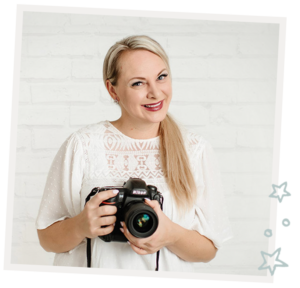
I'm
Lisa DiGeso
I’m on a mission to create uplifting online experiences for photographers ready to elevate their art, their business and their mindset.(...and have fun along the way!)

